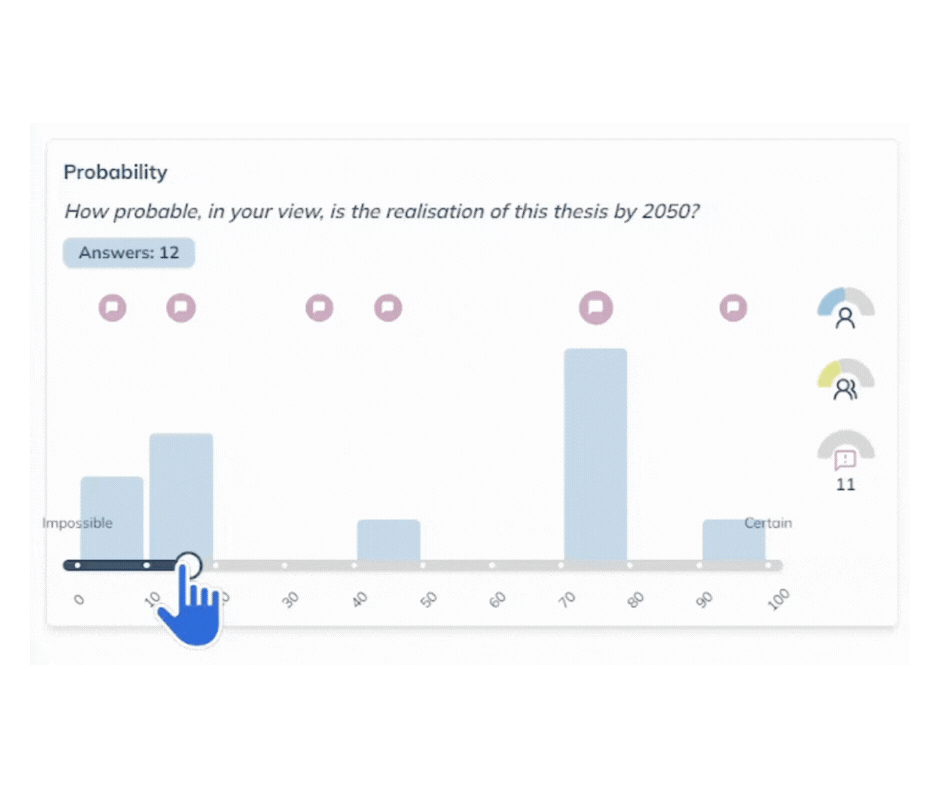Delphi pitfalls
Avoid these 18 common mistakes for better results in using delphi tools.

The Delphi method holds incredible potential for unlocking deep collective insights and forging informed consensus on complex issues. However, realizing this potential isn’t automatic. Like any powerful methodology, Delphi requires careful execution, and several common pitfalls can easily derail a study, leading to frustration, wasted effort, and unreliable results. Avoiding these mistakes isn’t just about procedural correctness; it’s about ensuring you capture the true value of your expert panel’s collective wisdom. Here are 18 critical “don’ts” to keep in mind when designing and running your next Delphi study.
Overall design and goal
-
Don’t focus primarily on consensus
While convergence can be an outcome, making “reaching consensus” the main goal or KPI often leads to pressure to conform and masks valuable disagreement. Delphi’s true power lies in understanding the range of perspectives and the reasons behind them, fostering learning and shared understanding. Do: Focus on facilitating mutual understanding and exploring the full spectrum of reasoned opinions. Informed consensus, if it emerges, should be built on shared understanding, not just statistical convergence.
-
Don’t overcomplicate your questionnaire
Just like any survey, overwhelming participants with too many questions, complex rating scales, or excessive demands for justification leads to fatigue and superficial answers. This cognitive overload undermines thoughtful engagement. Do: Prioritize ruthlessly. Keep the number of core questions manageable, focus on what’s essential, and respect participants’ time to encourage thoughtful engagement and re-engagement. Remember: less is often more.
-
Don’t use ambiguous or leading questions
Just like in any survey (again), poorly worded questions are a primary source of unreliable data. Questions that are unclear, contain jargon, or subtly suggest a desired answer will bias the results and confuse participants. Do: Craft clear, concise, neutral questions. Pilot test your questionnaire rigorously to identify potential confusion before launching.
Process and feedback
-
Don’t show group feedback prematurely
Revealing histograms, averages, or others’ comments before a participant has submitted their own initial, independent judgment contaminates their first assessment and undermines a core Delphi principle. Do: Ensure the platform only reveals group feedback after the participant has provided their initial input on a question.
-
Avoid providing disaggregated feedback during the study
Showing feedback broken down by participant subgroups (e.g., “managers think X, engineers think Y”, “patients think X, caregivers think Y”) during the active rounds reintroduces potential biases related to group authority or identity, undermining the principle of judging arguments on merit alone. Participants might give undue weight to the opinions of certain groups perceived as more expert or authoritative, undermining the goal of independent reassessment based on aggregated, anonymized rationale. While analyzing group differences later is valuable, presenting feedback this way risks distorting the consensus process. Do: Keep feedback aggregated and anonymous during the iterative process. Analyze subgroup differences after the study concludes.
-
Don’t disable or hide justifications – they ARE the Delphi
Reducing Delphi to just quantitative ratings and statistical feedback fundamentally misunderstands the method. The qualitative justifications – the ‘why’ behind the ratings – are where the crucial context, assumptions, differing perspectives, and innovative ideas reside. They are essential for participants to truly learn from each other and for informed opinion revision to occur. Do: Always require justifications for assessments and, critically, choose a platform that makes these justifications easily accessible, readable, connectable to the ratings, and central to the participant experience. A Delphi without visible reasoning isn’t truly a Delphi.
-
Don’t hide or obscure outlier views – they might be gold
An overemphasis on the majority view or statistical convergence (means, medians) inherently marginalizes outliers. While sometimes outliers are simply errors, they often represent crucial dissenting opinions, weak signals of future change, innovative ideas that challenge the status quo, or warnings about risks the majority overlooked. Platforms that bury these comments in long lists or only visualize the central tendency effectively silence these potentially vital voices. Do: Utilize platforms and feedback methods specifically designed to ensure outlier perspectives and their reasoning are visible and easily considered. Next-generation platforms like 4CF Halnyx 2.0 use tools to easily explore the arguments supporting minority viewpoints, ensuring valuable divergence isn’t lost.
-
Don’t default to tedious round-based Delphi if modern RTD is available
While classic Multi-Round Delphi (MRD) has its history, sticking to its slow, sequential rounds can be unnecessarily burdensome and less effective today if better options exist. Multiple rounds take a lot of time and often lead to participant fatigue and dropout, while analysis is tedious for organizers. Modern, next-generation Real-Time Delphi (RTD) platforms offer a far more dynamic, engaging, and efficient alternative. More importantly, well-designed RTD platforms don’t just accelerate the process; their features for interaction and easy exploration of reasoning can facilitate deeper understanding than often achievable in the stop-start nature of MRD. Do: Unless specific constraints require separate rounds (a rarity now), choose advanced RTD for maximizing insight and engagement in contemporary studies.
-
If possible, don’t obscure opinion evolution (make learning visible)
Delphi is fundamentally a learning process where participants refine views based on peer reasoning. Obscuring how and why individuals change their assessments or justifications after seeing feedback makes this learning process invisible and less impactful. Participants lose valuable insight into which arguments are proving persuasive and how collective understanding is developing. While displaying these dynamics clearly can be challenging without specialised tools, next-generation RTD platforms are increasingly designed to make this ‘visible learning’ a core feature. Do: Utilize platforms that offer features to track and optionally highlight significant revisions or link specific comments to subsequent opinion changes, adding transparency and depth to the understanding of the group’s evolving perspective.
Platform and interface
-
Don’t use a clunky, unintuitive interface – UX in Delphi matters immensely!
A difficult-to-navigate, visually confusing, or slow-performing platform isn’t just annoying; it actively harms your study. Participant frustration leads directly to lower engagement, higher dropout rates, rushed answers, and reluctance to explore peer reasoning or provide thoughtful comments. The quality of your insights is directly impacted by the quality of the user experience. Do: Prioritize platforms with modern, clean, intuitive interfaces designed specifically for the Delphi process. An effortless, even enjoyable, user experience like that offered by 4CF Halnyx 2.0 encourages deeper participation, better retention, and ultimately, higher quality data.
-
Don’t force sequential navigation – it kills RTD dynamics
Delphi, especially Real-Time Delphi, is not a static survey; it’s a dynamic learning and reflection process. Participants need the freedom to navigate based on evolving insights and group activity. Platforms that rigidly force users through questions one-by-one, preventing easy movement back and forth or jumps to specific items, fundamentally misunderstand and hinder this process. Participants may want to revisit a specific question precisely because they see new compelling arguments added by others, notice their view has significantly diverged from the shifting group consensus (ideally – highlighted by an indicator), or observe high disagreement emerging on an item and wish to re-evaluate justifications. Prioritizing click-through of answered questions as the primary navigation, especially for returning users, stifles this natural, reactive engagement, causes frustration, and prevents the capture of valuable, timely revisions or counter-arguments. Do: Choose platforms built for complete navigational freedom. Participants must be able to instantly jump to any question or section, driven either by their own reflective process or by system cues indicating new activity or significant changes, thereby fully enabling the interactive and iterative power of RTD. Modern platforms like 4CF Halnyx 2.0 are specifically designed with this essential flexibility in mind, allowing experts to focus their attention where it’s needed most.
-
Don’t risk data chaos with unreliable login systems
Be wary of platforms where accessing the study relies solely on a generic invitation link that, upon each use, potentially creates a new, unrecognized participant entry instead of identifying the returning user. This specific setup is extremely prone to error – if participants inevitably re-click the original invite, you can end up with multiple disconnected entries for the same person, rendering your data chaotic and potentially unusable. Do: Insist on platforms that prioritize both security and user convenience in access, use streamlined, robust, reliable authentication methods that always recognize returning participants correctly.
Panel management and setup
-
Don’t neglect holistic expert selection criteria (seek the ‘Foxes’)
Simply gathering ‘big names’ or those with impressive credentials isn’t sufficient. Effective expert selection requires defining clear criteria upfront that encompass not only relevant knowledge but also diversity of perspective and, crucially, cognitive style. Research consistently shows experts resembling Tetlock’s ‘foxes’ (adaptable, multidisciplinary, comfortable with uncertainty, cautious in predictions) often outperform highly confident ‘hedgehogs’ (focused on one big theory, resistant to changing their mind) in complex judgment and forecasting tasks. Do: Define criteria that look beyond credentials to actively seek diverse viewpoints and, where possible, evidence of ‘fox-like’ thinking – look for intellectual humility, nuanced reasoning, those who draw from multiple frameworks, and potentially track records over confident assertions. Explicitly aiming for cognitive diversity alongside subject matter expertise helps build a panel more likely to generate robust, reliable insights rather than overconfident groupthink.
-
Don’t rely on self-rated expertise – it can be actively harmful!
While asking about expertise can seem intuitive, using self-ratings to weight participant contributions is a risky practice that potentially can severely compromise your results. Research (most famously by Philip Tetlock) shows a weak, often negative, correlation between expert confidence/self-rating and actual predictive accuracy on complex issues. Overly confident ‘hedgehogs’ frequently perform worse than more cautious, self-critical ‘foxes’. Therefore, weighting by self-rated expertise can systematically give more influence to precisely those participants most likely to be wrong, actively degrading the collective judgment you seek to improve. It prioritizes confidence over competence and directly undermines the rationale for using an expert panel. Do: Completely avoid weighting Delphi inputs based on self-rated expertise or confidence. Treat all participants’ quantitative inputs equally and focus attention on evolving consensus and analysing the qualitative reasoning provided by all participants. The value lies in the arguments and learning from each other, not the self-assessed certainty.
-
Don’t overlook data protection and privacy compliance
As with any other survey type, when recruiting and interacting with expert panels, you are processing personal data (contact information, potentially demographic data, and their opinions which might be linked back). Ignoring data protection regulations (like GDPR in the EU, or other regional/sectoral rules) and your own organization’s privacy policies is a significant legal and ethical risk, potentially leading to fines and loss of trust. Do: Address data protection from the very beginning. Include clear privacy notices and obtain explicit consent before the study starts, explaining precisely how data will be collected, stored securely, processed, anonymized in reports, and what rights participants have (e.g., withdrawal). Ensure your chosen platform meets required security standards and data processing agreements are in place if necessary. Consult with legal or data protection experts if you have any doubts.
-
Don’t underestimate participant briefing and instructions
Assuming experts intuitively know how your Delphi process works and what is expected of them can lead to confusion, inconsistent responses, and frustration. Even if you’re using the most intuitive platform in the world, each Delphi survey is different. Do: Provide clear and concise introductory information covering the study’s goals, the Delphi process steps, platform usage, anonymity rules, and the timeline. Keep it concise to encourage everyone to read it. Clear expectations prevent problems later.
Analysis and follow-up
-
Don’t ignore the qualitative data – it’s where the real insight lives
Treating Delphi as primarily a quantitative exercise and focusing only on the final scores or convergence rates is a critical mistake. The numbers show what the group thinks, but the qualitative justifications explain why. This reasoning contains the essential context, assumptions, nuances, innovative ideas, and the true basis for agreement or disagreement. Ignoring it leads to shallow conclusions and misses the richest insights. Do: Plan an in-depth qualitative analysis. Choose platforms with built-in tools that facilitate organizing, exploring, and analyzing this vital qualitative data efficiently, even with large panels.
-
Don’t fail to close the loop
Experts volunteer valuable time and intellectual effort. Leaving them hanging without sharing the study’s outcomes, thanking them or letting them know how the results will be used is disrespectful and damages goodwill for future participation. Do: If possible, provide participants with a summary report of the aggregated findings (maintaining anonymity) and always make sure to thank them for their crucial role in the process.
Avoiding pitfalls maximizes insight
The Delphi method offers a robust process for tapping into collective intelligence, but its effectiveness depends on careful execution. By consciously avoiding these common pitfalls – through thoughtful design, rigorous facilitation, and the use of appropriate modern tools – you can significantly increase the quality, reliability, and insightful value of your Delphi studies. Choosing a next-generation Real-Time Delphi platform like Halnyx 2.0 designed specifically to address many of these challenges and facilitate deep understanding, is a critical step towards ensuring your Delphi delivers on its promise.

Experience the next generation of Delphi
4CF Halnyx 2.0 provides the intuitive, powerful, and insight-focused platform needed to conduct effective Real-Time Delphi studies that deliver meaningful results.
Interested in Delphi and RTD? Explore our expert series:
4CF Delphi Expert Series offers comprehensive insights, drawing on extensive experience, covering everything from the fundamentals to advanced applications and the crucial role of next-generation platforms. Whether you're new to Delphi or an experienced practitioner, explore these articles to deepen your knowledge and enhance your results.






Explored these? Discover even more in our full Delphi series
Interested in Delphi and RTD? Explore our expert series:
4CF Delphi Expert Series offers comprehensive insights, drawing on extensive experience, covering everything from the fundamentals to advanced applications and the crucial role of next-generation platforms. Whether you're new to Delphi or an experienced practitioner, explore these articles to deepen your knowledge and enhance your results.
Explored these? Discover even more in our full Delphi series
Stay updated! Subscribe to our newsletter:
By subscribing to our newsletter, you consent to the processing of the provided data. The data controller is 4CF Sp. z o.o., its registered office is located in Warsaw, 10/14 Trzech Krzyży Square, postal code: 00-499.
We process your data solely for the purpose of sending information about 4CF Sp. z o.o. and its activities via e-mail. Your data will be processed until your consent is revoked through a link that will be included in each newsletter. The withdrawal of consent shall not affect the lawfulness of processing based on consent before its withdrawal. Providing your data is voluntary, but necessary if you wish to receive information about 4CF Sp. z o.o. and its activities. We may transfer the data to our suppliers of services related to the processing of personal data, e.g. IT service providers. Such entities process data on the basis of a contract with our company and only in accordance with our instructions. You have the right to request access to your personal data, its rectification, deletion or limitation of processing, as well as the right to lodge a complaint with the supervisory authority. More information about your rights and about the processing of your personal data can be found in our privacy policy.






